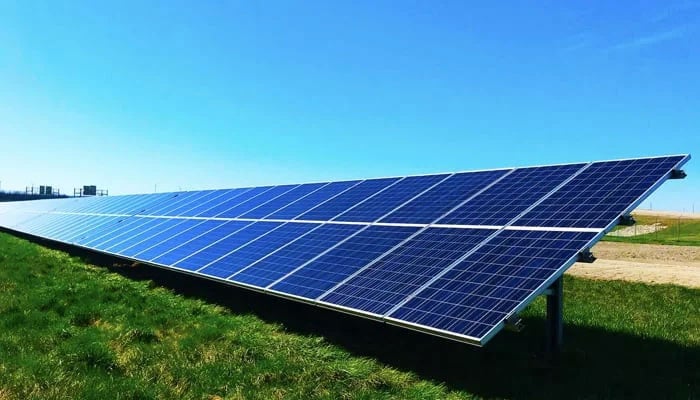AKU to install 3.3MW solar system as part of its de-carbonisation plan
As part of its commitment to net zero by 2030, the Aga Khan University (AKU) is installing its largest solar photovoltaic (PV) project to date.
For commencement of the project, a signing ceremony was recently held with Exide Pakistan Limited that would be executing the project at the AKU’s Stadium Road Campus in Karachi, Pakistan.
Renewable energy is one of the most effective ways to reduce greenhouse gas emissions and transition to clean energy systems. Solar irradiation is very high in Pakistan which makes solar PV ideal for energy generation in the country.
In 2022, the AKU installed 550-kilowatt solar PV on three of its campus roofs, resulting in highly positive environmental impact.
In the project recently launched, 3.3-megawatt solar PV would be installed across the remaining roofs as well as three large parking areas of the campus, providing the much-needed shade to the cars parked below. The installation of the new panels would take place in phases and its completion has been aimed by April 2025.
AKU President Dr Sulaiman Shahabuddin called it a major step forward in implementing the AKU’s de-carbonisation plan that was set in 2022.
The AKU’s goal of net zero emissions by 2030 involves reducing absolute emissions in line with science using renewable energy and other strategies. Renewable energy must go hand in hand with increased energy efficiency, such as improved buildings, efficient equipment and behavioural changes.
The AKU is rapidly progressing on all these areas of emissions reduction and has been closely monitoring its emissions footprint while aligning with the university’s plan.
“The partnership between AKU and Exide Pakistan Limited to provide clean and free electricity is commendable. Not only does it benefit AKU, but it also sets a shining example for other hospitals and universities,” said Exide Pakistan’s Altaf Hashwani.
The solar project would also reduce the varsity’s dependence on the K-Electric and improve local air quality. The solar PV not only provides carbon-free electricity and reduces noise and air pollution, but also significantly lowers the cost of electricity. The project is expected to save 1,900 tonnes of carbon dioxide emission every year, or the equivalent emissions produced by burning 800,000 litres of petrol in a car.
-
 Pentagon Threatens To Cut Ties With Anthropic Over AI Safeguards Dispute
Pentagon Threatens To Cut Ties With Anthropic Over AI Safeguards Dispute -
 Meghan Markle's Father Shares Fresh Health Update
Meghan Markle's Father Shares Fresh Health Update -
 Travis Kelce Takes Hilarious Jab At Taylor Swift In Valentine’s Day Post
Travis Kelce Takes Hilarious Jab At Taylor Swift In Valentine’s Day Post -
 NASA Confirms Arrival Of SpaceX Crew-12 Astronauts At The International Space Station
NASA Confirms Arrival Of SpaceX Crew-12 Astronauts At The International Space Station -
 Can AI Bully Humans? Bot Publicly Criticises Engineer After Code Rejection
Can AI Bully Humans? Bot Publicly Criticises Engineer After Code Rejection -
 Search For Savannah Guthrie’s Abducted Mom Enters Unthinkable Phase
Search For Savannah Guthrie’s Abducted Mom Enters Unthinkable Phase -
 Imagine Dragons Star, Dan Reynolds Recalls 'frustrating' Diagnosis
Imagine Dragons Star, Dan Reynolds Recalls 'frustrating' Diagnosis -
 Steve Jobs Once Called Google Over Single Shade Of Yellow: Here’s Why
Steve Jobs Once Called Google Over Single Shade Of Yellow: Here’s Why -
 Barack Obama Addresses UFO Mystery: Aliens Are ‘real’ But Debunks Area 51 Conspiracy Theories
Barack Obama Addresses UFO Mystery: Aliens Are ‘real’ But Debunks Area 51 Conspiracy Theories -
 Selma Blair Explains Why Multiple Sclerosis 'isn't So Scary'
Selma Blair Explains Why Multiple Sclerosis 'isn't So Scary' -
 Will Smith Surprises Wife Jada Pinkett With Unusual Gift On Valentine's Day
Will Smith Surprises Wife Jada Pinkett With Unusual Gift On Valentine's Day -
 Shamed Andrew Has Paid Royal Favours With ‘national Scandal’
Shamed Andrew Has Paid Royal Favours With ‘national Scandal’ -
 Prince William Ticked Off By How Andrew ‘behaved With Staff’
Prince William Ticked Off By How Andrew ‘behaved With Staff’ -
 Prince William Questions Himself ‘what’s The Point’ After Saudi Trip
Prince William Questions Himself ‘what’s The Point’ After Saudi Trip -
 James Van Der Beek's Friends Helped Fund Ranch Purchase Before His Death At 48
James Van Der Beek's Friends Helped Fund Ranch Purchase Before His Death At 48 -
 King Charles ‘very Much’ Wants Andrew To Testify At US Congress
King Charles ‘very Much’ Wants Andrew To Testify At US Congress




